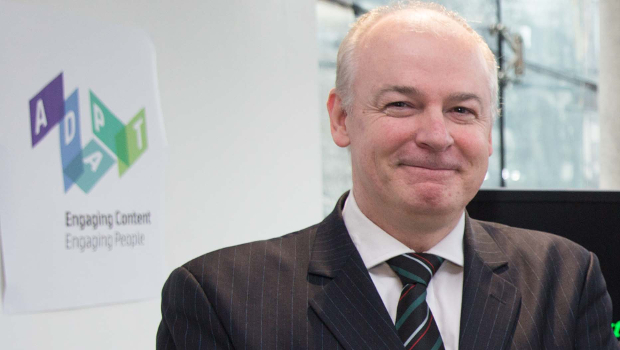
Focus on research: Prof Vincent Wade, Adapt
Prof Vincent Wade is a founding director of Adapt, the Science Foundation Ireland research centre for digital content and a co-applicant at d-real, the centre for research training in digitally enhanced technologies such as virtual and augmented reality. In this interview he discusses the evolution of Adapt and the skills gap in blended reality research.
This is sort of Adapt 2.0. the centre has grown a lot since its inception. Which areas of research have surprised you in their popularity?
Adapt is entering its second six-year cycle. When it began, we were focusing a lot on areas of natural language processing, personalisation, machine translation, language, with some aspects to do with images. What we found during the first phase of Adapt there was a growing interest in video.
As Adapt evolved it became clear that content has been thought of in a more seamless fashion. Whether it’s video, text, speech, image, VR, AR, they are expected to be bundled together. What you’re looking at is a choice of whatever medium suits the message or the audience.
We’re seeing that content is flowing across the different digital media, all driven by AI. We found at Adapt is that having all of those media being researched together gives us a much more powerful base for developing next-generation systems. We’re working with organisations, international research centres and industry to develop the next generation of interactions, virtual realities, virtual agents (chatbots). All of this work is happening across language barriers, across multiple applications. That’s why we see the future as having this seamless integration of the physical world and the digital world – as we interact in the physical world, we also interact with the digital world and vice versa.
When did it emerge that there was this skills gap holding back the kind of research that you’d like to see more of?
The skills gap has become very apparent, particularly last six years as more and more of artificial intelligence and digital media gets embedded into everyday applications, whether it be your smartphone, your smart speakers, your smart house, the different agents embedded as part of your interaction with a website or any form of digital delivery. These technologies require require high-level skills to be able to develop next generation. The companies that are here developing them are looking for a talent pool that they can draw from, which are already at the tactical level that they need.
The centre for research training programmes, and particularly d-real, are focused in this area of providing a richer talent pool for organisations from any sector, they can be in healthcare, fintech to ICT and entertainment, we’re seeing it right across the board.
We also have a very strong spin out and start-up culture in Ireland. These companies need new ideas and young talent. On the other side, we have research centres like Adapt, which have an infrastructure and are part of the overall research ecosystem of Ireland, and they’ve proven really successful in terms of scientific breakthroughs. The CRTs sit in the gap look at how we can develop programmes which expose PhD students to the best technology and also the industry problems so they can develop own skill sets, and make breakthroughs themselves as part of their PhDs but then be part of that talent pool. We give researchers extra support in terms of training, exposure to world-class researchers, industry problems, infrastructure that they might need, and then also to promote and develop leadership skills. These are our leaders of tomorrow for the country. The other part is that these programmes act as a magnet for attracting more talent to Ireland.
On the relationship there between d-real and Adapt, do you see a sort of ongoing conversation between the centre and the CRT towards coming up with new ideas for research?
Absolutely. Ireland is not a big country. The academics, the supervisors in something like the CRTs, come from the centres. So what we’re able to do at Adapt is provide expertise and knowledge, so that the PhD students get a double support. That gives the CRT students access to breaking insights, seminars, and training programmes that we would have in the centres. By that we’re able to maximise and optimise the the research ecosystem in Ireland. So I think that that’s a great way of thinking of it. The CRTs are broader in terms of its membership, but for specific areas they can rely on support of centres like Adapt.
There’s been a lot of discussion about Facebook’s metaverse. Do you think this sort of walled garden approach will be successful for VR in the same way that say Apple App Store was for the iPhone?
It’s difficult to exactly say how the areas will evolve. There are two aspects to this: what the technology can do and then what the business model is. From a technology perspective, what we’ve learned is that these sort of digital environments need low walls. We don’t want to put people in echo chambers.
What we would do in Adapt is support technology that gives us a better view of or better interaction with these environments, and what are the best ways to allow these environments to connect to each other. There isn’t one Web provider for the world, there are a series of providers of infrastructure and the Web sits on top of that.
You also have a danger of monopoly, but then again, disruption happens. Even though some people might want a monopoly, they may not be able to capture one.








Subscribers 0
Fans 0
Followers 0
Followers